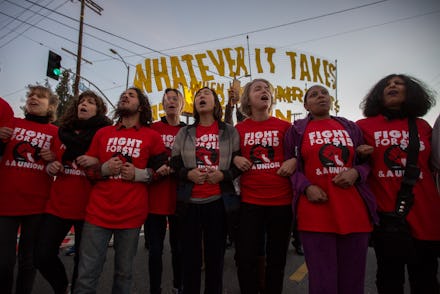Equal pay is widely understood to be a feminist issue — so why isn't the Fight for $15?

The idea that men and women should receive equal pay for equal work is probably among the least controversial feminist positions because, in 2017, it's pretty difficult to argue against.
Hollywood actresses like Patricia Arquette have traded in their standard acceptance speeches for impassioned calls for wage equality, while Facebook COO Sheryl Sandberg created a whole new brand of feminism when she began coaching women on how to combat workplace inequality by "leaning in," making equal pay part of a mainstream dialogue.
And on Tuesday, Equal Pay Day, most of us can easily recall the hard statistics — that white women make about 79 cents to the man's dollar while black and Latina women make 63 cents and 54 cents, respectively — that prove the wage gap has to do centrally with gender as well as race.
It would seem to follow then, that if feminists consider the gender wage gap to be among their chief causes, they'd be just as concerned by another fight for fair wages — the Fight for $15, the movement to raise the national minimum wage.
A November report from Oxfam America and the Institute for Women's Policy Research found that of the 23.5 million Americans working low-wage jobs, 19 million of them are women. Adult women made up some 75% of these low-wage earners as of 2014, and many of them are the heads of their households and primary breadwinners — especially in low-income families.
The staggering number of women earning these low wages is only expected to increase: By 2024, 1 in 6 of all jobs will be considered low-wage women's work, according to the report.
Meanwhile, the strike on International Women's Day only served to shed light on the particular circumstances low-income women face in the United States. Many people worried these women may not be able to participate in A Day Without A Woman because they couldn't afford to lose a day's wages or risk losing their jobs. That such an explicitly feminist day of action had become surrounded by anxieties about low-wage earning women speaks to how central those issues should be to the movement.
"Today, we see an example of true sacrifice in the Fight for $15, where workers have gone on strike against international chains like McDonald's," organizer Tamika Mallory wrote in a March 8 op-ed for Time. She argued that low-income women had led strikes throughout history, shaping the modern-day feminist movement.
All things considered, it seems almost self-evident that the Fight for $15 isn't just a progressive issue, but a feminist one.
But at least one feminist wasn't convinced.
In March, Marisa Kabas, who writes the anti-Donald Trump newsletter "Resistable," penned an opinion piece for Harper's Bazaar about rising above "women who say you're not feminist enough." The column largely explored Kabas' feelings that the pro-Palestine messages of the women's strike had isolated her as a Jewish-American woman, but this experience had also prompted her to ask a broader question: What issues are strictly feminist issues?
She alludes to the Fight for $15 briefly, writing, "There are male feminists and capitalist feminists and feminists who don't necessarily believe in the $15 minimum wage and feminists who don't believe in free abortions, and yes, feminists who don't believe in abortion at all."
Famed feminist activist Gloria Steinem hardily disagrees.
The prominent feminist leader urged legislators to be on the "right side of history" and raise New York's minimum wage for fast food workers. "In a low-wage industry where women — including working mothers who are one step away from the safety net — are overrepresented, a fair income is a must," she said in June 2015.
Others, more embedded in the movement itself, would even argue that the face of the Fight for $15 is undoubtedly a female one.
According to Jennifer Epps-Addison, who helped coordinate the Fight for $15 in Wisconsin, the coalition is predominately led by women of color.
In her April 2016 piece on the "critical role" women play in the Fight for $15, she wrote that these women are leading efforts not just to raise the minimum wage but to "form unions so that they can negotiate for access to health care, a fair work schedule and paid medical and sick leave, among other things."
We know that these victories are crucial to not just women's success, but their well being and the well being of their children.
"In a low-wage industry where women ... are overrepresented, a fair income is a must."
But despite even Steinem's calls for fair wages, despite the historically close relationship between the feminist and workers' rights movements, the Fight for $15 doesn't seem to have gained the same foothold in feminism as the fight for equal pay. The call to raise the minimum wage has been seen as a genderless issue belonging more to Sen. Bernie Sanders' supporters than Steinem's.
Some have argued that "not everything is a feminist issue," warning of the dangers of letting feminism out at the seams too much.
"Environmentalists don't have to demand equal pay and affordable child care; labor movements aren't expected to call for the abolition of rape culture," Katha Pollitt pointed out in a March piece for the Nation.
Is the Fight for $15 among the issues where feminists should draw the line?
If it is, on Equal Pay Day, many will harshly condemn the gender wage gap without realizing that, with 19 million women working low-wage jobs, the Fight for $15 must be part of the solution for closing it.